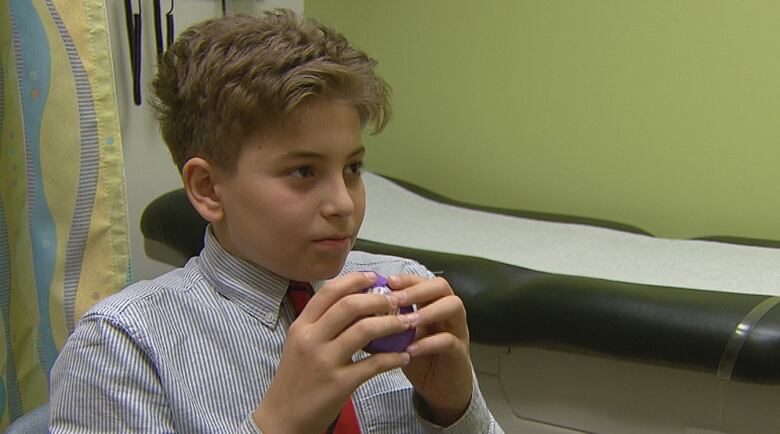Asthma diagnosis 'trivialized,' fuels overdiagnosis, doctors say
Inhalers sometimes used under inappropriate situation but more stringent diagnosis would help
More than 30 per cent of Canadians diagnosed with asthma don't in fact have it, a specialist says, on the heels of a British commentary that questions how inhalers have become "almost a fashion accessory."
Dr. Shawn Aaron is a respirologist at the Ottawa Hospital. Hisresearchinvolving roughly 500 adults, published in 2010,suggests asthma is overdiagnosed in about a third of Canadian adults and he's updating the findings. A recent Dutch study on more than 600 children diagnosed as having asthma found nearly 54 per cent likely did not have it.
"In adults we can do lung function tests because adults will co-operate with those," Aaron said. "But in children under sixit's impossible to do these tests."
A lung function test such as spirometryinvolves breathing into a tube on a device that measures air flowing out of the lungs.
Aaron agrees with a British commentary in the April issue of the Archives of Disease in Childhood, titled, "Is asthma overdiagnosed?"
In the commentary, Dr. Andrew Bush of the Paediatric Respiratory Medicine department at Royal Brompton Hospital says the hallmark of asthma wheeze is used imprecisely by both parents and healthcare professionals.
Proper use of asthmamedicationsdramatically improves quality of life, andreduces risk of asthma attacks and deaths, the commentators said.
Besides the cost ofinhalers, the commentary points to the potential hazards of putting children on long-term treatment without making every effort to diagnose with stringent, objective criteria.
The commentaryalso notesinhalers do have side-effects including growth suppression, adrenal failure and increased risk of respiratory infections.
Long-term inhaled steroids can also result in cataracts, glaucoma and osteoporosis, Aaron said.
"We propose that one contributing factor is that the diagnosis of asthma has been trivialized and inhalers dispensed for no good reason, and have become almost a fashion accessory," Bush and his co-author Louise Fleming of the U.K. National Heart and Lung Institute wrote.
Last year, the Canadian Thoracic Society and Canadian Paediatric Society released a joint position paper on the diagnosis and management of asthma in preschoolers.
For example, if a child starts to wheeze, it could caused bya viral infection that will go away, Aaron said.
He suggestsif aphysician wants to keep a patient on medications for more than three to six months then parents should ask about diagnostic tests to confirm.

"Sometimes we are using inhalers in an inappropriate situation and you definitely want to match therapy to the disease process," said Dr. Tania Samanta, a pediatric respirologist at St. Joseph's Health Centre in Toronto.
Since asthma fluctuates depending on the season and triggers, Samanta said she follows patients on a regular basis.
An asthma attack is frightening, said Elijah Ullmann, 12,a patient at the clinic.
"Your body feels like it's shutting down," Elijah said. "It's like you're underwater and you can't come up."
His mother, Randi Hampson, said Elijahwas diagnosed with asthma as a toddler after he was hospitalized for about 10 days following a respiratory infection.
"He was on a number of different medications and they've been reducing the dosages of those medications over the years," Hampson said. "We want him to be a happy, healthy kid and to not use unnecessary treatment. That's the goal."
No one shouldstop asthma medication on their ownwithout consulting aphysician,Aaron cautioned.













_(720p).jpg)


 OFFICIAL HD MUSIC VIDEO.jpg)
.jpg)



























































































